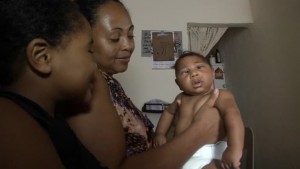

But she is not alone. In the hospital where he was born, dozens of other mothers also gave birth to infants with abnormally small heads. More than 1,000 cases of microcephaly have been reported in just a few months in Pernambuco state, the epicentre of the Zika outbreak.
The 37-year-old mother of three, said she had no idea that her baby would have the rare condition and felt that doctors at the hospital failed to provide more information.
“It was a shock for us because no one knew how to explain it (baby’s condition) to us and no one knew what microcephaly was and what it caused. We wanted to know more about how he would develop and no one had that information to give us. We felt completely lost,” she said.
For a country that for years has battled the Aedes aegypti mosquito – responsible for previous epidemics of dengue, yellow fever and other tropical diseases – the outbreak of Zika has caught the government, public health administrators and doctors entirely off guard.
Although a cause has not been proven, microcephaly has been clinically linked by scientists to mothers believed to have been infected with Zika while expecting.
Pernambuco has more than one-third of the 3,700 cases of microcephaly reported in Brazil since September, and its hospitals have been overwhelmed.
At the public children’s hospital Barao de Lucena in Recife, a long line of mothers holding their microcephalic babies wait in line for hours to get an appointment with a neurologist.
Vanessa Van der Linden, one of only five child neurologists in the state, was the first doctor to notice the alarming rise in microcephaly cases last September, alerting public health authorities.
The defects surged in November, when three babies were born with microcephaly on the same night at the dilapidated hospital where she works.
Van der Linden said she was shocked by the extent of the issue.
“In the beginning I thought it was a new virus or a new illness, but I never expected it would affect so many and that it would become such a tragedy with so many children affected,” she said.
One of her patients is the three-month daughter of 27-year-old toll booth worker, Gleyse Kelly da Silva, who had a rash, a light fever and a back ache for three days last April.
Her daughter, Maria Geovana, was born in October with microcephaly. Silva still hopes her baby will learn to speak, but she is frustrated with the public health system, which has yet to provide any therapy.
“I think they could help us more by bringing in more doctors, because there are so many babies and even mothers from other towns are coming here to get treatment and they are not managing to get appointments,” said Silva.
A tropical climate, dense cities, poor sanitation and slipshod construction provided ideal conditions for mosquito breeding grounds and the spread of the Zika virus in Brazil’s northeast, across the country and to more than 20 others throughout the Americas.
Amid warnings from governments and multilateral health agencies, pregnant women in Brazil and beyond are now seeking to avoid exposure to the mosquito, at least until contagion is contained or scientists develop a vaccine, which could still take years.
But the crisis will demand special care for hundreds of deformed or neurologically damaged children for years to come, a new burden on already deficient hospitals in a public health system suffering from budget cuts because of government shortfalls and an economic recession.
Recife’s health secretary, Jailson Correia, said they were still evaluating the extent of the crisis to come up with a plan to provide long-term support to the affected families.
“The first thing is we are still not aware of the dimension of the problem, so to that extent we are still in the diagnosis phase. We are studying and we are providing help and support to different studies that are taking place currently here in Recife and other parts of the state,” he said.
In November, Recife asked Brazil’s federal government for 29 million reais ($7.18 million) in funding to deal with the crisis, and so far has received only 1.3 million reais.
Brazilian health officials this week said they plan to reach an agreement with the U.S. National Institutes of Health to work on a vaccine. Some Latin American countries have advised women to delay getting pregnant.
To step up its fight against the mosquito, Brazil has deployed thousands of municipal, state and federal workers, including soldiers, to scour cities for mosquito breeding grounds, fumigate and educate residents on the dangers of still and stagnant water, where the female insects lay their eggs.
On February 13, the government will deploy 220,000 troops in a one-day mobilization to hand out leaflets and help identify potential trouble spots. Hundreds of soldiers have already started to work in Recife’s poor neighbourhoods.
Only 29 new cases of microcephaly were reported last week in all of Pernambuco, compared to a peak of 196 in late November. After selling out of insect repellent during the two most critical months, the product is once more on drug store shelves.
But for many, of course, the improvements come too late. (Reuters)
